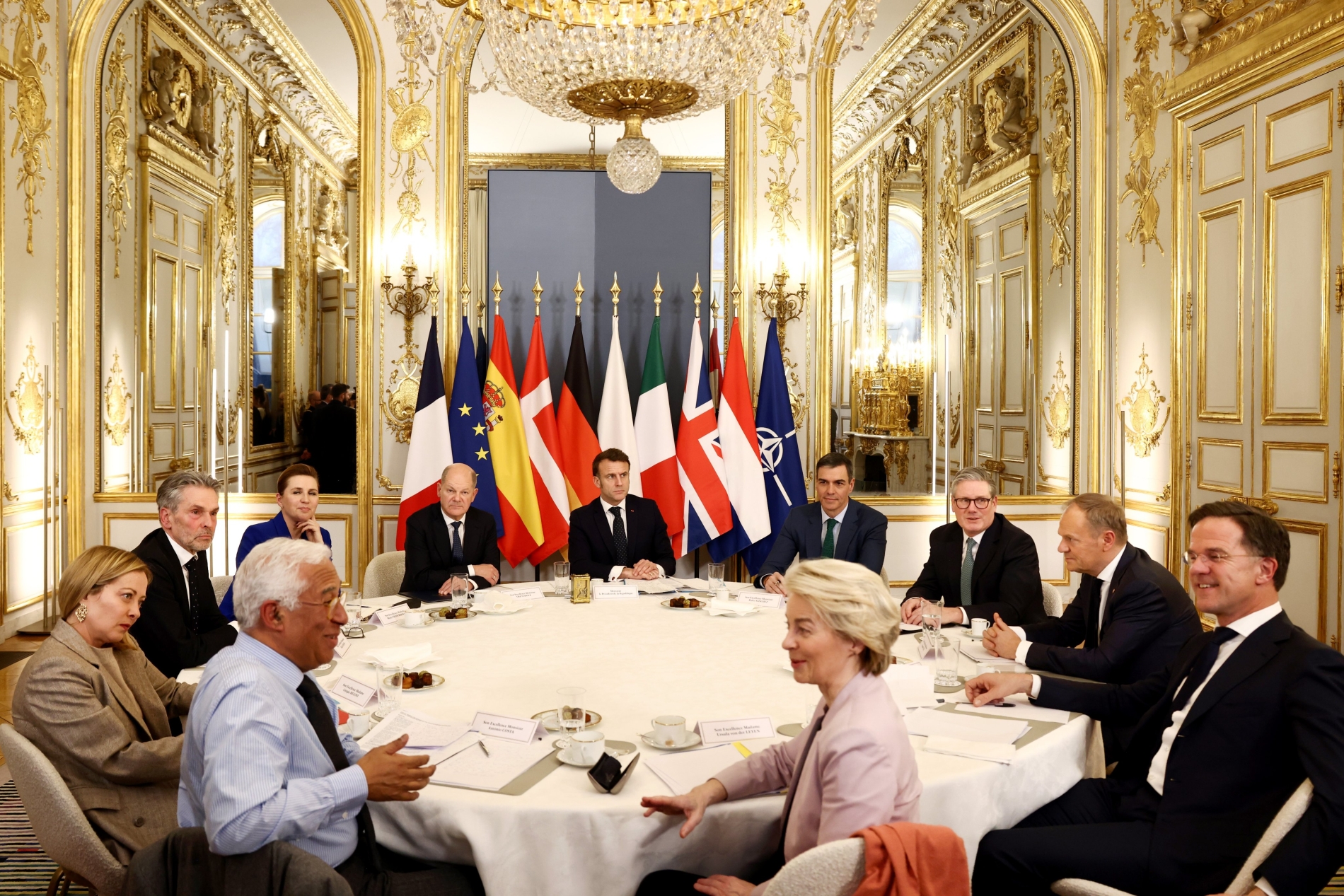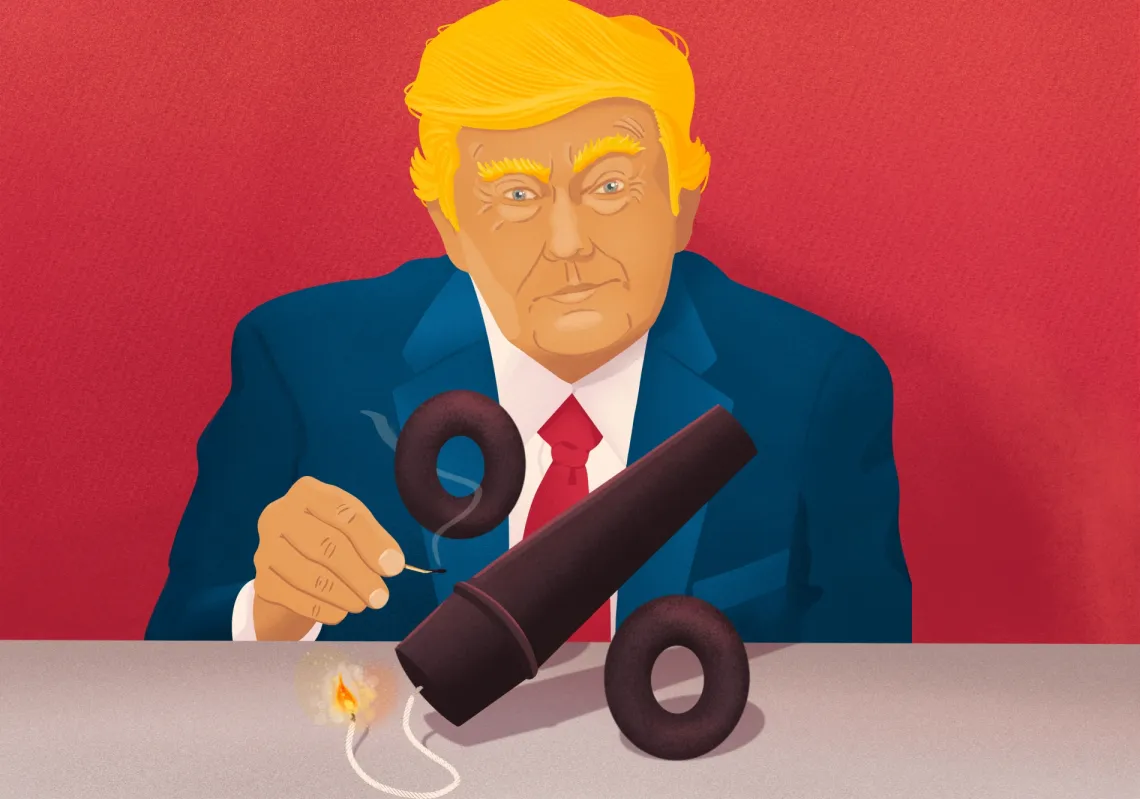Donald Trump’s first 100 days of his second term in office have arguably presented the biggest challenge to the transatlantic relationship between Washington and Europe since the collapse of the Iron Curtain.
There have, of course, been previous occasions when US ties with Europe have come under severe strain, such as during the Suez crisis in 1956 and, more recently, in the run-up to the American-led invasion of Iraq in 2003, which Germany and France vehemently opposed.
French President Jacques Chirac’s fierce criticism of the war even resulted in the more enthusiastic supporters of the Bush administration referring to their erstwhile French allies as “cheese-eating surrender monkeys”, an insult unworthy of one of America’s long-standing European allies.
Yet, when compared with the tumult that Trump’s first 100 days in office have caused within the transatlantic alliance, these breaches are minor by comparison, as they have generally proved short-lived and ultimately ended in reconciliation.
By contrast, Trump’s unprecedented assault on some key pillars of the long-standing alliance between the US and Europe, which was forged during the darkest days of World War Two, have left many European leaders wondering whether the changes brought about by Trump’s combative style means that relations between Washington and its European allies will ever be the same again.
Read more: Are Europe and the US headed for divorce?
From NATO to tariffs, from Ukraine to Gaza, Trump’s unique approach to tackling global issues from his “America First” perspective has meant that his administration has frequently found itself adopting directly opposing views and policies to those espoused by his European counterparts.
Ukraine and NATO
The Ukraine conflict is a notable case in point. While all the major European powers remain committed to supporting Ukraine in its war against neighbouring Russia, from the moment he took office, Trump has opted to pursue a completely different course of action. He has often appeared to be far more interested in doing deals with Russian President Vladimir Putin than in maintaining support for Ukrainian President Volodymyr Zelenskyy, which has been the official US policy under the previous Biden administration.

Read more: Trump and Zelenskyy have an Oval Office smackdown
There was certainly huge dismay among European leaders following Trump’s high-octane clash with the Ukrainian leader in the Oval Office in February, when the US president effectively accused Ukraine of provoking the war with Russia, and said Zelenskyy was trying to start World War III.
Trump’s subsequent decision to suspend all arms supplies and intelligence sharing to Ukraine had the potential to inflict a devastating blow on Ukraine’s ability to defend itself against Russia, as Kyiv has come to rely heavily on US support in its war effort. Trump’s decision to withdraw military support led to Russian forces seizing the initiative on the battlefield, securing a number of gains in the Kursk region of southern Russia, where Ukrainian forces had briefly succeeded in capturing territory at the end of last year.
In the event, the arms suspension lasted for only a few days after it achieved its desired result of persuading Zelenskyy to give serious consideration to peace talks.
Trump’s high-handed treatment of Zelenskyy is said to stem from his frustration at not having made more progress in his attempts to end the Ukraine conflict, having previously boasted that he would end the war within 24 hours of taking office.
Trump’s single-minded pursuit of securing a peace deal for Ukraine has also ruffled feathers in diplomatic circles in Europe, as his decision to open direct talks with Russian President Vladimir Putin, with US special envoy Steve Witkoff handling the sensitive ceasefire talks with the Kremlin, meant that Europe was effectively sidelined from the process.
Nor have European leaders been impressed by the outline ceasefire deal that has emerged from the White House, which proposes that Ukrainian territory captured by Russian forces in eastern Ukraine and Crimea since hostilities began back in 2014 be ceded to Moscow, with Washington agreeing to recognise the territory as Russian sovereign territory.
Such a move would completely undermine the post-war international order, in which the territorial integrity of nation-states is regarded as inviolable.

European leaders, who remain committed to supporting Ukraine’s fight to maintain its independence, have devised their own plan whereby they will commit to providing some form of assurance force to Ukraine in the event of a ceasefire, to deter any further acts of Russian aggression.
Hopes that Trump might be persuaded to adopt a less pro-Russian tone in his attempts to effect a ceasefire have risen following the American president’s surprise meeting with Zelenskyy at the Vatican during the funeral of Pope Francis. After the meeting, Trump made a direct appeal to Putin to end Russian attacks against Ukrainian civilians, suggesting that the White House may in future be less accommodating to Moscow’s demands.
Even so, Trump’s antagonistic attitude towards Europe during his first 100 days in office has prompted many European leaders to give serious consideration as to whether they can rely on the security umbrella the US has traditionally provided to safeguard European interests within the NATO alliance.
Europe has been taken aback by accusations made by senior members of the Trump administration, such as Vice President JD Vance, that the Europeans have been freeloading off the Americans for many decades.
Read more: Vance leaves Europe gobsmacked
This has prompted governments in Paris, Berlin and London to give serious consideration to increasing their defence budgets and taking measures to improve their ability to defend themselves against future threats, with or without American support.
This could soon become a priority if Trump persists with his threat to scale back Washington’s military presence in Europe, where thousands of US forces have remained stationed since the end of the Cold War.
This has led longtime allies such as Germany and France to conclude that they can no longer depend on Washington. Germany would be especially affected if Trump decides to withdraw US forces, as Germany hosts the largest contingent of US forces on the continent and stations American nuclear weapons on its territory.















